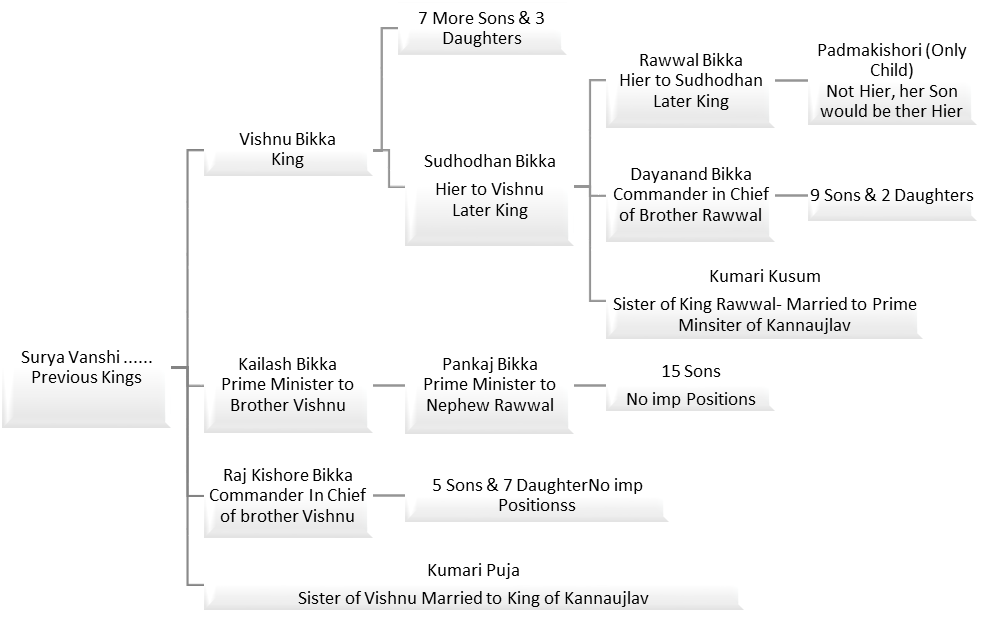CHAPTER 1: SWAYMVAR
The night was silent. Heavy dew fell without a word on white woodland carpet. White petals with lilac veins appeared fast asleep, curling in their three petals inwards. The barking deer did not care about the sleepy snow leopard hiding behind the mossy rocks, colonized by lichens and ferns. Foxes and jackals were quietly chewing dried up bones under thick cover of Withania. Air did not wail today as it passed through the needle like fingers of Deodar and Spruce. It was mourning silently.
Melancholy dripped from the walls of the royal apartment of Princess Padmakishori. Her room was dimly lighted. She had asked all the other torches to be extinguished except the four oil torches in the far corner of the chamber. It was a dark night for her. Padmakishori’s sobs were the silent witness to her broken dreams and foreboding heart.
King Rawwal Bikka of Bikka dynasty had sent out invitation to all Suryavanshi[1], Chandravanshi[2] and Agnivanshi[3] kings and princess to attend his daughter’s Swaymvar[4]. Swaymvar of his only child Padmakishori, was one of the most important tasks for him as a King.
Like all previous princesses of Garvpundir, Padmakishori was looking forward to her Swaymvar. Since last two years, she could only think about the prince she would pick among her suitors on the day of Swaymvar. The blithe full days and blushful nights of princess who just stepped into the whirl wind years of teen, had etched a picture perfect of the Prince, she would surrender her body. Padma just needed to close her eyes to see the perfect prince who would entice her and take her on an amorous journey. It was her destiny, her dream and her right to choose her life partner.
King Rawwal had far serious affair weighing on his mind than the flight of fantasy of his daughter of sixteen summers[5]. The duties of a King outweighed that of a father. Padma’s dreams were ruthlessly crushed when the King announced that the Swaymvar would be contest based. There would be three contests among the suitors. The winner would marry his daughter. Rawwal was aware that he was being unfair towards his daughter, but it was a necessary evil.
A daughter’s right to select her groom was snatched away by the King who wanted such a son in-law who would secure his daughter’s future and that of his kingdom. He wanted a strong ally. He needed a strong political alliance to safeguard his Garvpundir against the invading tribes from North West and gives a boost to the ailing economy that was in all-time low.
The contests were carefully chosen. The first one was hunting. A strong and deft warrior could lead his army successfully against all enemies. A good warrior is often a skillful hunter! Each king and prince participating in the contest would take only ten soldiers from Garvpundir’s army for the hunt. Each party would be given a marked area to camp and they would have unlimited access to the dense forest of Pine, Fir, Yew, Cypress, Chir, Oaks, Birch, Willow and Alders to hunt. They would be provided with basic amenities in their camp for the two phases of the moon[6]. At the end, the king or prince with most prized hunts would win the contest.
The second contest was then a game of Chausar[7]. A winner in a battle could get a kingdom. Ensuring the dynasty ruled forever was another! The politics during the years of peace often shapes the outcome of future wars. Many kingdoms subliminally have lost their grandeur in dangerous years of peace. Kururaastra was one of them. The King Rawwal did not want a similar fate for his daughter.
The last contest was Shastraat[8]. Three hundred pundits from far and wide were invited for this event. This contest was included to test the wisdom of the contestants. Strength and strategies without wisdom would be futile. The King Rawwal wanted such a son in-law who would represent the holy tri-unity of strength, strategy and wisdom. The winner of all these three would marry his daughter. In case of a tie, Padma would then choose her groom. King Rawwal had thought very carefully when he chalked out the outline of the contest.
Padma was flabbergasted when she heard about the contests from her mother, Jaiwanti Devi. How could her father use her for his petty political dreams? Was she a political pawn whose wishes had to be sacrificed for greater good? Her mouth felt bitter. Her father had already decided her fate and was now consulting pundits for an auspicious date to send the invitations and to hold the event. Never before had Padma felt so helpless and lonely. She was standing alone in an ice cocoon, screaming about her right to choose her husband. The people around her continued their work oblivious to her and her trapped screams. The ice was too thick to break. Her palm was bleeding but she did not feel any pain. Her hands were numb. Why did her mother not stop her father from taking this call? Would it have made any difference had her three brothers been alive? Would she still be sold as a queen to a King for the kingdom?
The weather in mountains is always unpredictable. It was bright and sunny few hours ago, now the reddish clouds of torrential rain were looming over the horizon. Not a breath of air, not a glimpse of star or moon – the sky was as lonely as Padma. Night was uncommonly silent, waiting with a held breath for storm to break. The King of Garvpundir, Rawwal Bikka was looking out of his window on third floor of his palace. The entire palace and the fort in front of it was carved out from the mountains. It was uncommonly cold night. The fate of his kingdom was similar to the night. More than three centuries had passed since the Great War that had devastated the entire subcontinent. Some refer to this war as the great Mahabharata. The Great War has seen the complete annihilation of the most powerful clan, saving only six members of the royal family. The war changed the map of Kururaastra. The War concluded with the emperor being replaced on the throne. With him, the fate of the subcontinent was changed.
After The Great War, the society underwent huge changes. The kingdoms scorched with the horrors of war could only hope for everlasting peace. However, first life needed to return. Healing had to be done before attempting an ever lasting peace. The families needed to be re-established. Tears had to be wiped off from all eyes. There was hardly any family which had not seen a loved one being a fodder to the war. All those families needed a smile back on their lips. People shattered by the Great War began picking up their lives. A century and half passed in a flash, rebuilding the ruins of what once was a flourishing life.
Surviving through the horrors of the Great War, Kururaastra was committed to forging a peaceful and friendly alliance with all the kingdoms far and near. Garvpundir also received invitation of friendship. They proposed an alliance of marriage. An alliance of family ties would further strengthen the bonds. Third Princess of Garvpundir, Kishori Dayanti was married to the nephew and a member of ministerial council of Kururaastra. The matrimony brought greater glory and importance to Garvpundir. That was the golden era of peace and prosperity in the subcontinent. Life that had been destroyed in Great War began building up. Slowly, the scars of the past were forgotten. The Great War which was once a life changing event was turning into legend and bedtime stories. The stories of the Great War were beginning to fill eyes with astonishment instead of tears. Garvpundir had forged new relationships. With a powerful alliance like Kururaastra by his side, Garvpundir rose to power.
The cycle of time continues relentlessly. Decay sets in heart of healthy flowers in full bloom and after decay from the rotting black, barks again, with a new stem of life germinating. The luster of the empire that brought the new era had started to diminish. A millennium and half passed and the magnificence that once was known with Kururaastra was diminishing faster. The new rulers were no heroes. The builders of the kingdom had done their share of hard work building a new nation from the rubbles of war. They handed the gift of peace and prosperity to their next generation of rulers. Their successors were different.
The generation that had only seen prosperity handed down generation after generation, slowly forgot the hard work that went in building a great nation from rubbles of the Great War. The newer rulers of Kururaastra had started taking life and the luxuries bestowed on them by birth for granted. They spend their lives in luxury. They did not keep up the rigor of maintaining good political alliances or strong trade links. Smaller kingdoms under the banner of Kururaastra were losing their sense of security. The rulers of Kururaastra did not look beyond few main banners under them. Their trade and political links were now confined to only one strong kingdom – Samarastra. Samarastra is a strong powerful island kingdom. Slowly, the smaller kingdoms began to break off. Decay has set in once again in Kururaastra. This time it was slow as a termite, but deadly, eating up the entire kingdom from within. As the empire grew weaker, Garvpundir’s became more and more obscure. From a strong ally, it became barely remembered a friendly kingdom in far inaccessible mountains. Garvpundir faded out of the minds of the rulers of Kururaastra.
The kings of Garvpundir still hoped that one day; Kururaastra would again rise to power and take care of the smaller kingdoms like it did in the golden days. Garvpundir was waiting for such a time. It had too much of faith in the blood of heroes who walked liked Gods on Earth. Kururaastra was the hub of all trade, with Kururaastra losing interest in trade, Garvpundir trading activities took a back seat. It remained content with trade relationship with smaller neighboring kingdoms.
Garvpundir territories ranged from the foot of Himalayas to its dizzying heights where life was possible. Life is difficult in the mountains. The rulers of Garvpundir unlike the ones in the plains had bigger challenges of providing basic amenities in the tough terrain with harshest conditions. Garvpundir started investing more time and resources, building roads linking the inaccessible regions of the kingdom. While Garvpundir was waiting for Kururaastra to come back to its former glory, its rulers started concentrating only on infrastructure. This single focus strategy was started by King Dasanand Bikka, who forgot all about trades and external politics and concentrated only on infrastructure. If rumors were to be believed, the King had promised that he would link each and every hamlet and temple in the kingdom with good roads.
The Prime Queen of Dasanand Bikka, Mittali Devi was on her way to the temple of her family deity on her palanquin to pray for painless delivery. A day or two before her delivery, the Queen would be confined to her room. The Prime Queen Mittali Devi wanted to offer prayers for a healthy son before her confinement started. Since last few days, dangerous omen of death was haunting her. Her heart was restless for her unborn child. She needed the mercy of her deity to ensure life of her unborn child. It had rained heavily the previous night and the temple was in elusive part of the mountain, but the Prime Queen had set her mind to the impossible task. There were landslides and path leading to the temple was dangerously steep and impassable in rainy season. King Dasanand Bikka and all the members of her family tried their best to stop Mittali from embarking on this journey, but she would listen to none of it. Mittali was determined to go; she said it was her calling. She had to go. She was right in a way. The call was from the Grim Reaper. He was waiting in some corner of the steep path to claim her and her unborn child. He claimed her soul and devoured the palanquin bearers. Grief and resentment had filled heart of the King Dasanand Bikka. He never forgave himself and set up a humongous task of building the infrastructure of Garvpundir. The rulers who came after him also followed his footstep. They had to fulfill the promise of the King Dasanand Bikka. It was believed that the King Dasanand Bikka has sworn on his death bed that, he would not step in heaven to meet his Queen Mittali, till all temples and hamlets were linked by good roads. The burden of unfulfilled oath falls to the sons. Till the time, Dasanand Bikka’s promise was not fulfilled by his sons and grandsons, he would not be granted a passage to heaven. His descendants kept fulfilling the promise of Dasanand Bikka by concentrating on infrastructure and forgetting the importance of strong ties with other kingdoms like Kururaastra. They did nothing to strengthen their terms with Kururaastra and other important kingdoms. It was a mistake for which Garvpundir would have to pay dearly in future.
The implacable time forgave none. It was just a matter of few cycles when it puts life back to remind it of the long forgotten lessons. Around two thousand and two hundred years after the Great War, Samarastra, the only strong ally of Kururaastra perished. Tsunami hit the island. Great waves engulfed the whole island. There were no survivors. Samarastra, the great kingmaker of the kingdoms was wiped out of the existence. With it crumbled the already crumbling future of Kururaastra. The end was near, but the rulers of Kururaastra could never see it, till it became a reality. Garvpundir was still under the illusion of safety under the banner of Kururaastra. If truth be told, Garvpundir and seventy more kingdoms under the banner of Kururaastra were alliance only for name sake. It has been years since Kururaastra took any interest in their welfare or any development in the trade or bilateral policies. For Kururaastra these kingdoms had become nothing more than non-hostile areas.
Apathy does not go unnoticed for long. How long would continuous indifference of the largest empire go unnoticed and unchallenged? When a large tree starts decaying, the younger and ambitious ones try to take its place. The same happened with Kururaastra. Maganda rose to challenge Kururaastra. A fierce war was waged. The war and siege continued for months and finally Kururaastra succumbed to the sword of Maganda. Major part of Kururaastra was taken over by Maganda. Few kingdoms that did not fight for Kururaastra declared their independence once Kururaastra fell. Maganda was new great banner of the Main land. For Garvpundir, it was just a change of banner from Kururaastra to Maganda.
The restless time did not stop there. It had to change its course. Some three and half centuries had passed since Maganda took over Kururaastra. All these years further deteriorated the ties with Garvpundir. Though, Maganda was successful in overthrowing oldest reigning monarchs of the subcontinent, it could not rule over the vast empire for long. Soon the kingdoms under Kururaastra began their tryst with destiny, some of them broke away amicably, and some declared independence, while some started their fight for freedom from Maganda. This story of political unrest continued for two and half centuries. Maganda realized, it could no longer rule such a vast empire. It was in its interest that, smaller kingdoms fought with each other. With kingdoms at war with each other, there would be no one main power or group of strong kingdoms to challenge Maganda. Maganda encouraged strives between smaller kingdoms.
Figure 1 Events from Great War
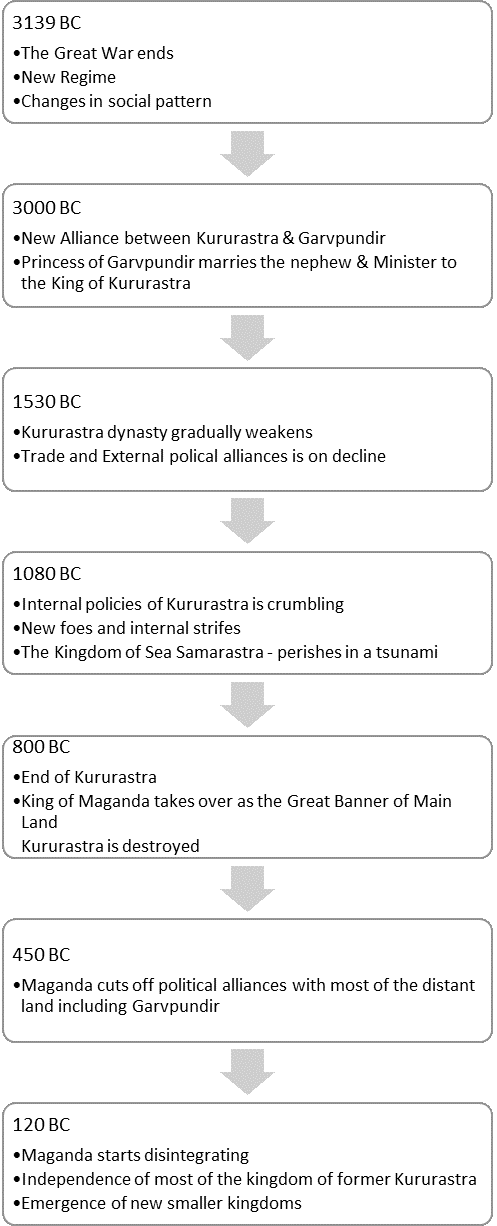
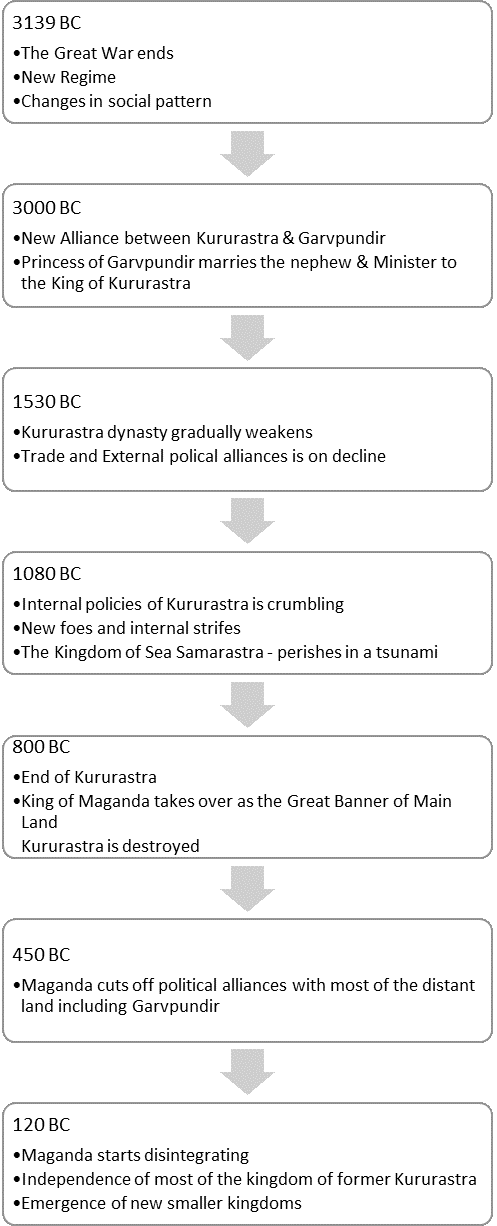
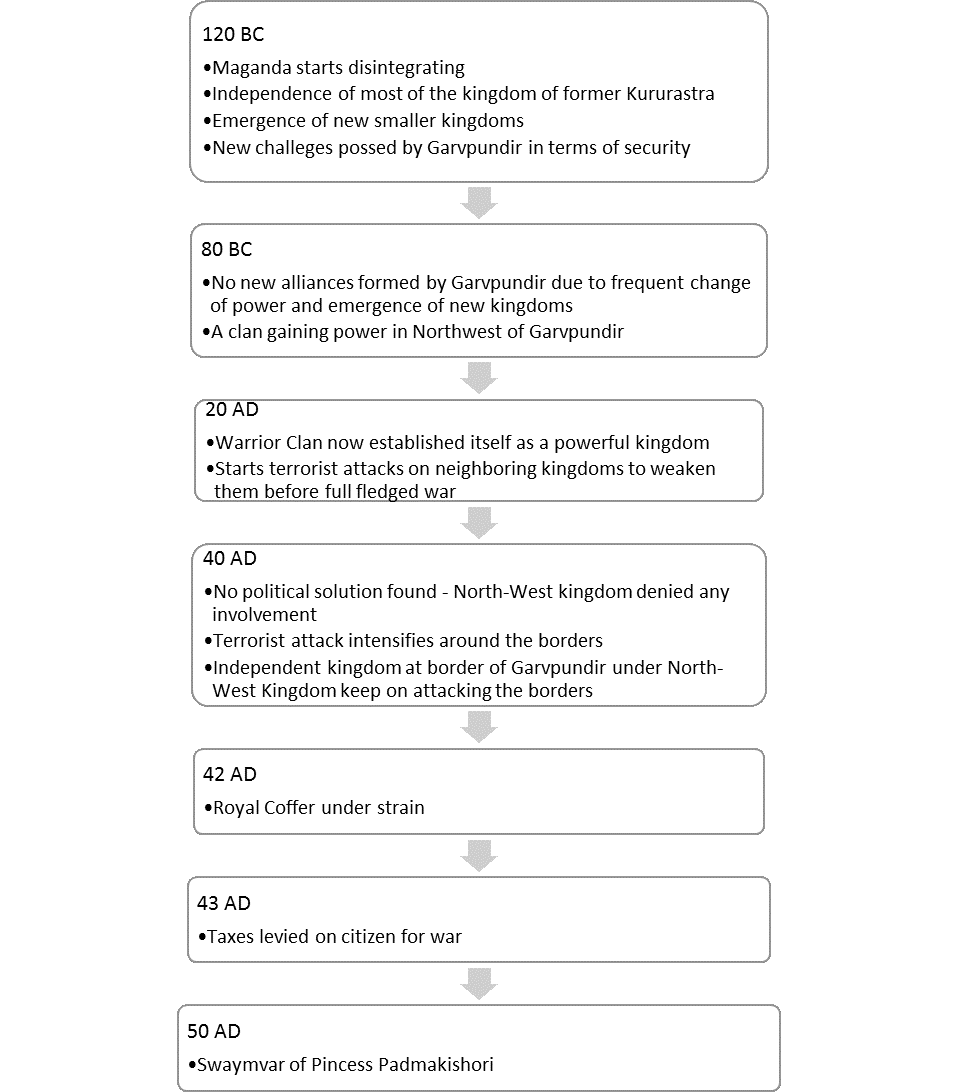
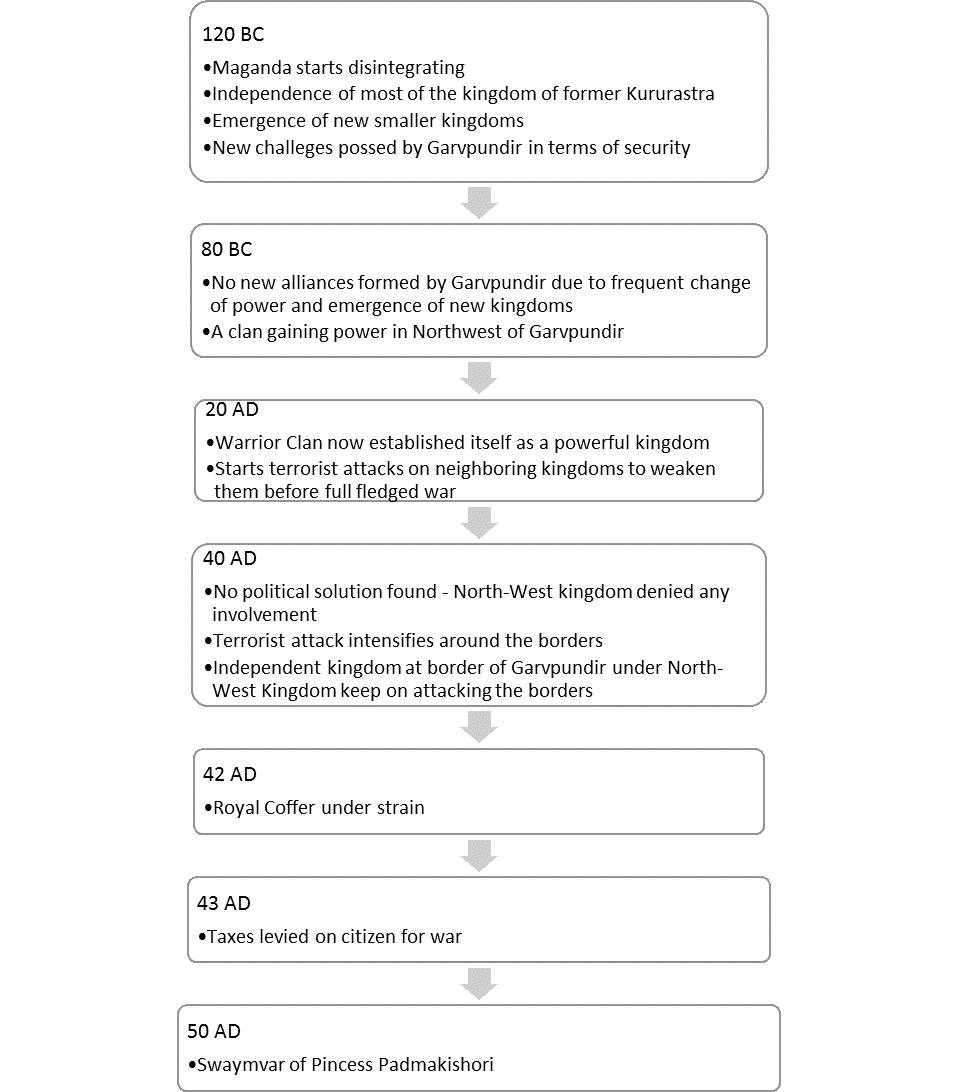
m3�M��}
 Naseha
Naseha
